Are you looking to upgrade your outdoor space while also doing your part for the environment? Eco-friendly paver patios might be the perfect solution for you. These sustainable options not only look great but also help reduce carbon footprint. By choosing eco-friendly materials and practices, you can create a beautiful, functional patio that’s kind to the planet.
Keep reading to discover the benefits of eco-friendly paver patios, explore different sustainable materials, and learn how to make your outdoor living space greener and more attractive.
What Are Eco-Friendly Paver Patios?

source: shadefxcanopies
An eco-friendly paver patio is made from materials that are sustainable and have a low environmental footprint. These materials can include recycled pavers, permeable pavers, and natural stones that are sourced responsibly.
Recycled pavers are made from repurposed materials like old concrete or bricks, giving new life to something that would otherwise end up in a landfill. Permeable pavers, on the other hand, are designed to allow water to pass through them, reducing runoff and helping manage stormwater.
The Importance of Sustainability in Landscaping
Sustainability in landscaping is crucial for several reasons:
- Environmental Protection: Traditional landscaping methods often involve the use of non-renewable resources and can lead to soil erosion, water pollution, and loss of biodiversity. By using sustainable practices and materials, we can protect the environment and conserve natural resources.
- Water Management: Permeable pavers help with water management by allowing rainwater to seep through the ground rather than run off into storm drains. This reduces the risk of flooding and helps replenish groundwater supplies.
- Resource Efficiency: Using recycled materials for paver patios reduces the demand for new raw materials, saving energy and reducing greenhouse gas emissions associated with manufacturing and transportation.
- Healthier and Beautiful Spaces: Eco-friendly materials often avoid the use of harmful chemicals found in traditional landscaping products. This leads to healthier outdoor living spaces for people, pets, and wildlife.
- Long-Term Savings: While the initial cost of eco-friendly materials might be higher, they often last longer and require less maintenance, leading to cost savings over time.
By choosing eco-friendly paver patios, homeowners can create stunning outdoor areas that not only enhance their living space but also contribute positively to the environment. This sustainable choice aligns with the growing trend of environmental consciousness and responsible living, making it a win-win for both the homeowner and the planet.
The Benefits of Eco-Friendly Paver Patios

source: The Spruce
Eco-friendly paver patios offer numerous benefits, making them an excellent choice for homeowners who want to create beautiful and sustainable outdoor spaces. Let’s explore the key advantages:
Environmental Benefits
Eco-friendly paver patios help the environment in several ways:
- Reduced Runoff: Traditional patios can lead to water runoff, which often carries pollutants into local water sources. Eco-friendly pavers, especially permeable ones, allow water to seep through the surface and into the ground. This process reduces runoff, helping to keep waterways cleaner.
- Improved Drainage: Permeable pavers also improve drainage. They prevent water from pooling on the surface, which can cause erosion and damage to landscaping. Instead, water filters through the pavers, replenishing groundwater supplies and maintaining a healthier ecosystem.
Long-Term Cost Savings
Choosing eco-friendly paver patios can lead to significant cost savings over time:
- Durability: Eco-friendly pavers are often made from recycled materials, which are designed to be durable and long-lasting. This means fewer replacements and repairs compared to traditional paving materials, saving money in the long run.
- Low Maintenance: These pavers typically require less maintenance. Permeable pavers reduce the risk of water damage and erosion, which can be costly to fix. Additionally, they are resistant to cracking and other common issues, further reducing maintenance costs.
Aesthetic Appeal and Versatility
Eco-friendly paver patios are not only good for the environment and your wallet but also add to the beauty and functionality of your outdoor space:
- Aesthetic Appeal: These pavers come in a variety of colors, shapes, and sizes, allowing homeowners to create visually stunning designs. Whether you prefer a natural, rustic look or a sleek, modern design, there are eco-friendly paving options to match any style.
- Versatility: Eco-friendly pavers can be used in various outdoor settings. They are ideal for patios, walkways, driveways, and even garden paths. Their versatility makes them a great choice for any landscaping project.
By choosing eco-friendly paver patios, homeowners can enjoy a beautiful, sustainable outdoor space that benefits the environment and saves money in the long run.
Permeable Pavers: A Sustainable Choice
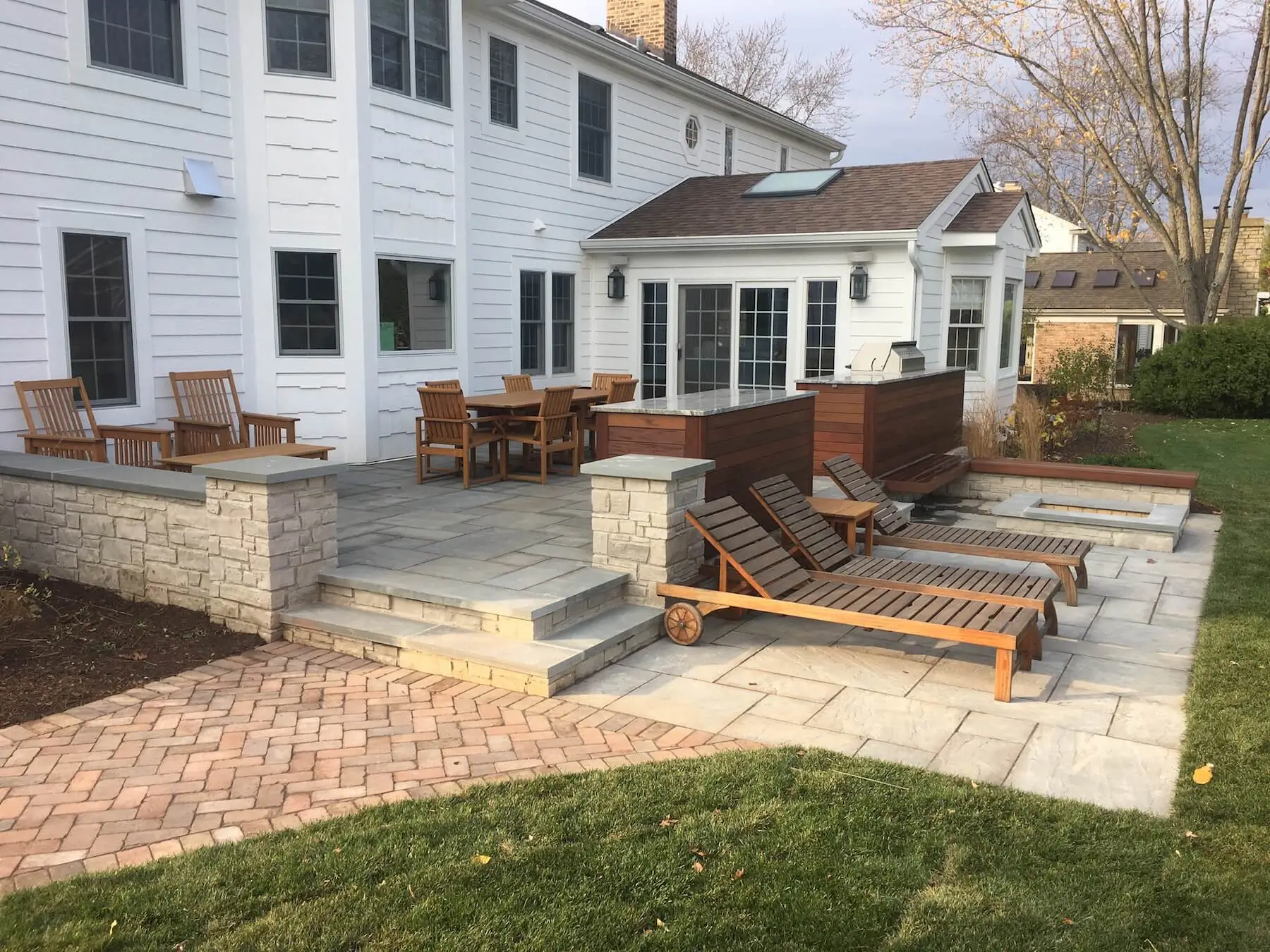
source: therectangular
Permeable pavers also go by the name porous or pervious pavers. They are paving stones designed to let water infiltrate through their surface. Unlike traditional pavers, permeable pavers help manage stormwater more effectively. They are made with larger gaps between the pavers or with a porous material that permits water to seep through.
Interlocking Concrete Pavers
Interlocking concrete pavers are a popular choice for many homeowners and landscape designers because of their durability, versatility, and aesthetic appeal. These pavers fit together like pieces of a puzzle, creating a stable and attractive surface.
Benefits of Interlocking Concrete Pavers:
- Durability: They are strong and long-lasting, handling significant weight and heavy foot traffic without cracking.
- Ease of Installation: Their design allows for easy installation, and individual pavers can be replaced without disturbing the surrounding area.
- Aesthetic Variety: Available in various shapes, colors, and creative design patterns, they can complement any design style.
- Low Maintenance: Interlocking pavers require minimal maintenance. Regular sweeping and occasional rinsing are typically sufficient.
While not naturally permeable, interlocking pavers can be installed with gaps filled with permeable materials like gravel or sand, allowing water to seep through and reducing runoff.
Permeable Concrete Pavers
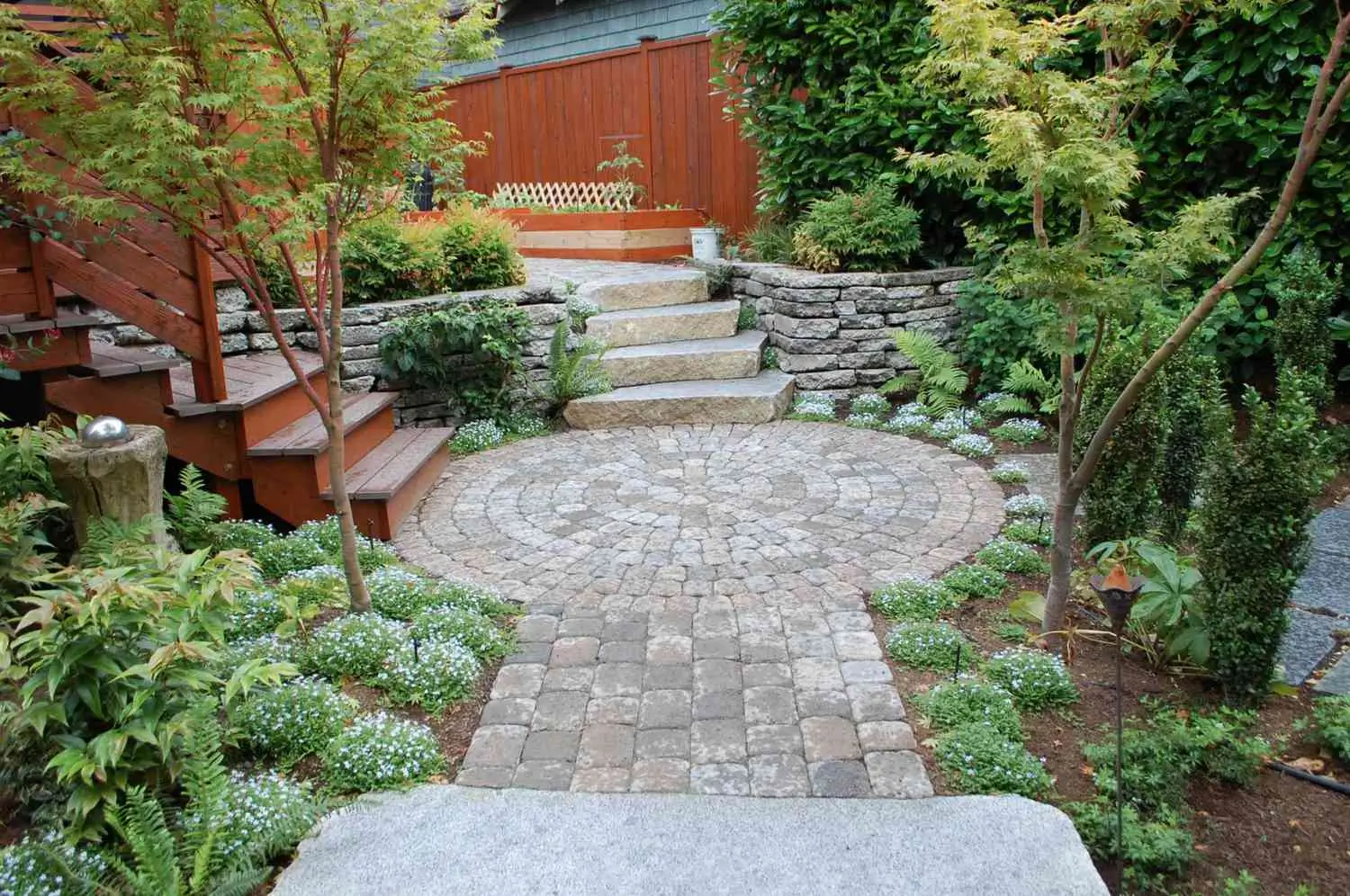
source: khoaluantotnghiep
Permeable concrete pavers allow water to pass through the surface. They reduce water runoff and promote natural water filtration. These pavers are made from a porous concrete mixture that has fewer fine particles, creating tiny gaps that let water pass through. They are often used in areas where managing stormwater is a concern.
Benefits of Permeable Concrete Pavers:
- Stormwater Management: They effectively reduce runoff, helping to prevent flooding and erosion.
- Cleaner Water System: By allowing water to filter through the ground, they help remove pollutants before the water enters the natural water system.
- Heat Reduction: They can reduce the heat island effect associated with traditional concrete surfaces.
- Eco-Friendly: Made from sustainable paver materials, they support green building practices and contribute to LEED certification points.
How Do Permeable Pavers Work?
Permeable pavers work by allowing water to pass through the joints or the material itself, filtering into the ground below. Here’s how they function:
- Surface Layer: The top layer consists of the permeable pavers themselves, which can come in various shapes, sizes, and colors to suit any design preference.
- Joint Fill Material: The gaps between the pavers are filled with small stones or gravel, which further facilitate water infiltration.
- Base Layers: Below the surface, there are layers of crushed stone or gravel. These layers provide structural support while also creating beautiful space for water to accumulate and slowly filter into the soil.
By mimicking natural ground absorption, permeable pavers reduce the amount of water that runs off into storm drains, helping to prevent flooding and erosion.
Environmentally Friendly Installation Practices
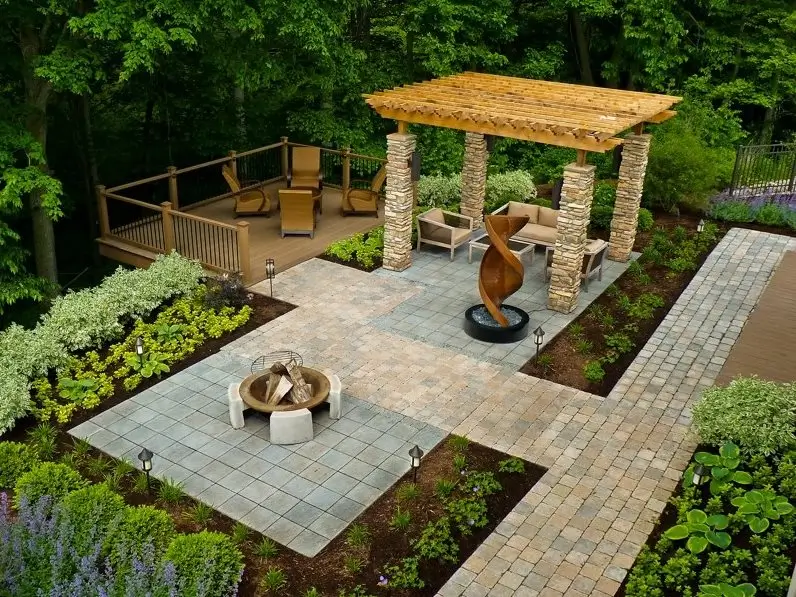
source: Landscaping
When it comes to installing an eco-friendly paver patio, the methods used are just as important as the materials chosen. Here are some sustainable installation techniques and tips for reducing waste and minimizing the environmental impact during the process.
Sustainable Installation Techniques
- Use of Permeable Base Materials: Instead of using traditional compacted gravel, use a permeable base. Crushed stone or recycled concrete are excellent choices for this purpose.
- Minimize Soil Disturbance: Avoid excessive digging and soil disturbance. This helps preserve the natural soil structure and reduces erosion. Using hand tools or smaller machinery can make this easier and more precise.
- Plan for Proper Drainage: Ensure the patio design includes proper drainage solutions. This can prevent water from pooling and reduce the risk of erosion. Techniques like installing French drains or creating slight slopes can be very effective.
Reducing Waste
- Accurate Measurements and Planning: Careful planning and precise measurements can reduce material waste. By measuring the area and calculating the needed materials, you can avoid over-purchasing and reduce leftover waste.
- Reuse and Recycle Materials: Use recycled materials whenever possible. Old pavers, bricks, and stones can often be repurposed. Additionally, any excess materials from the building project should be recycled or donated for future use.
- Efficient Cutting Practices: When cutting pavers, aim to make the most out of each piece. This reduces the amount of scrap material and ensures efficient use of resources. Try to plan cuts to minimize waste and make use of smaller pieces effectively.
By adopting these environmentally friendly installation practices, homeowners can create beautiful, sustainable paver patios that benefit both their outdoor spaces and the planet. Making thoughtful choices during the installation process ensures that the patio is not only functional and attractive but also kind to the environment.
Choosing the Right Materials for Your Eco-Friendly Paver Patio
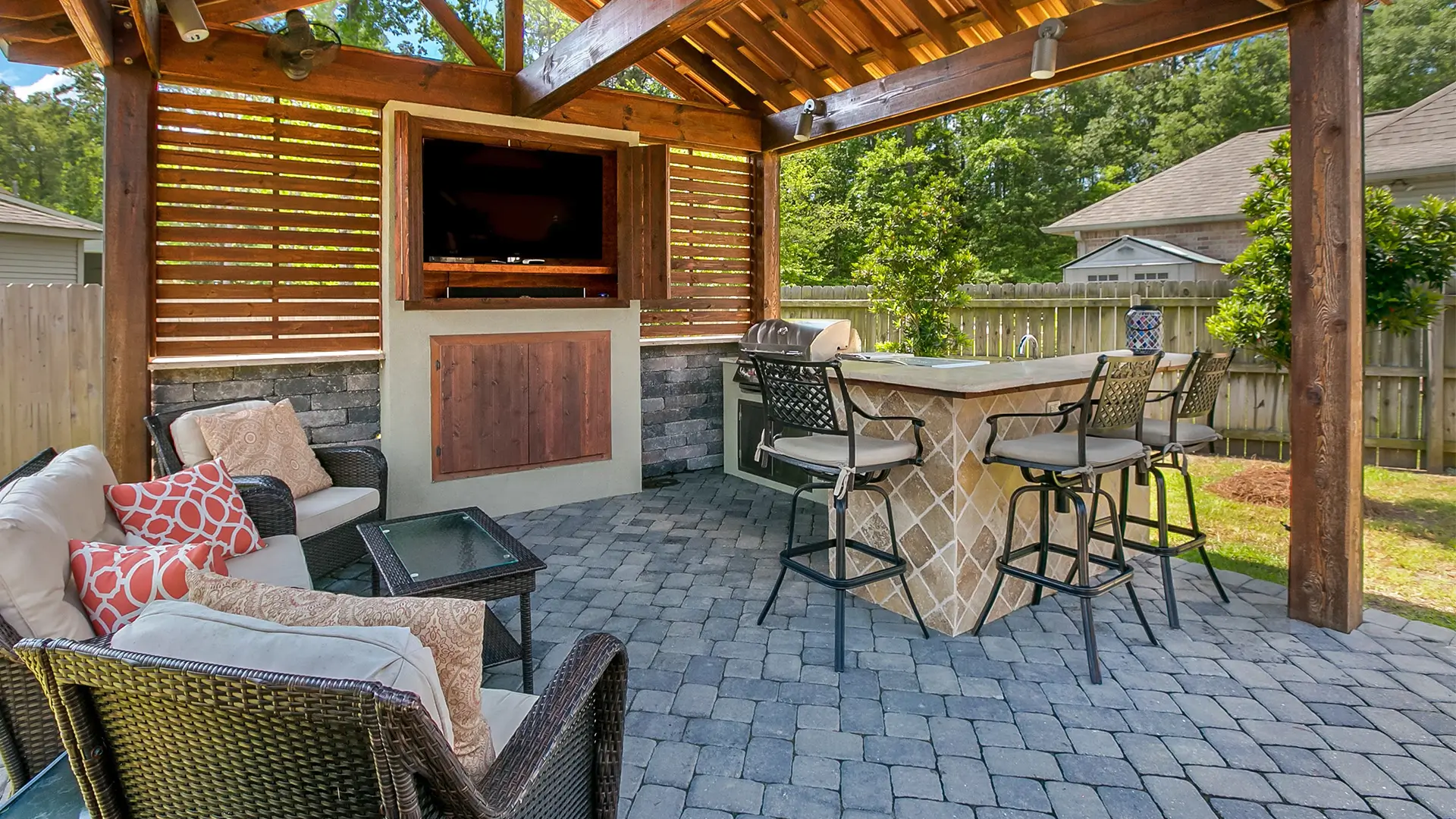
source: customoutdoorconcepts
When planning an eco-friendly paver patio, choosing the right materials is essential. Here is a guide on how to choose the best sustainable materials for an eco-friendly paver patio, along with tips on sourcing these products.
Natural Stone Pavers
Natural stone pavers are a popular choice for eco-friendly patios. These pavers are durable, visually appealing, and come in various styles and colors. Since they are sourced from the earth, they have a lower environmental impact compared to synthetic materials. However, stones must be sourced responsibly to avoid excessive environmental damage.
Concrete Pavers
Concrete pavers are another excellent option for eco-friendly patios. They are made from natural materials like sand, gravel, and cement. To make them more sustainable, look for pavers that include recycled content or are produced using eco-friendly manufacturing processes. Concrete pavers are versatile, affordable, and available in a wide range of designs.
Travertine Pavers
Travertine pavers are a type of natural stone that is highly durable and resistant to extreme weather conditions. They are often used in patios due to their natural beauty and non-slip surface. Travertine is environmentally friendly as it requires minimal processing. When sourcing travertine pavers, look for suppliers that prioritize sustainable quarrying practices.
Brick Pavers
Brick pavers are made from clay, a natural and abundant resource. These pavers are long-lasting and can be reclaimed and reused, making them an eco-friendly option. Brick pavers add a classic and timeless look to any patio. For a truly sustainable choice, consider using reclaimed bricks, which reduce the demand for new materials and minimize waste.
Coastal Patio Pavers offers a wide variety of sustainable paver options, including natural stone, concrete, travertine, and brick pavers. They are dedicated to providing eco-friendly and beautiful paving solutions for patios, ensuring that customers can create outdoor spaces while minimizing their environmental impact.
By carefully selecting and sourcing sustainable materials, homeowners can create an eco-friendly paver patio that is both beautiful and environmentally responsible. Explore a range of eco-friendly paver options and start your journey towards a greener outdoor space.
Final Thoughts
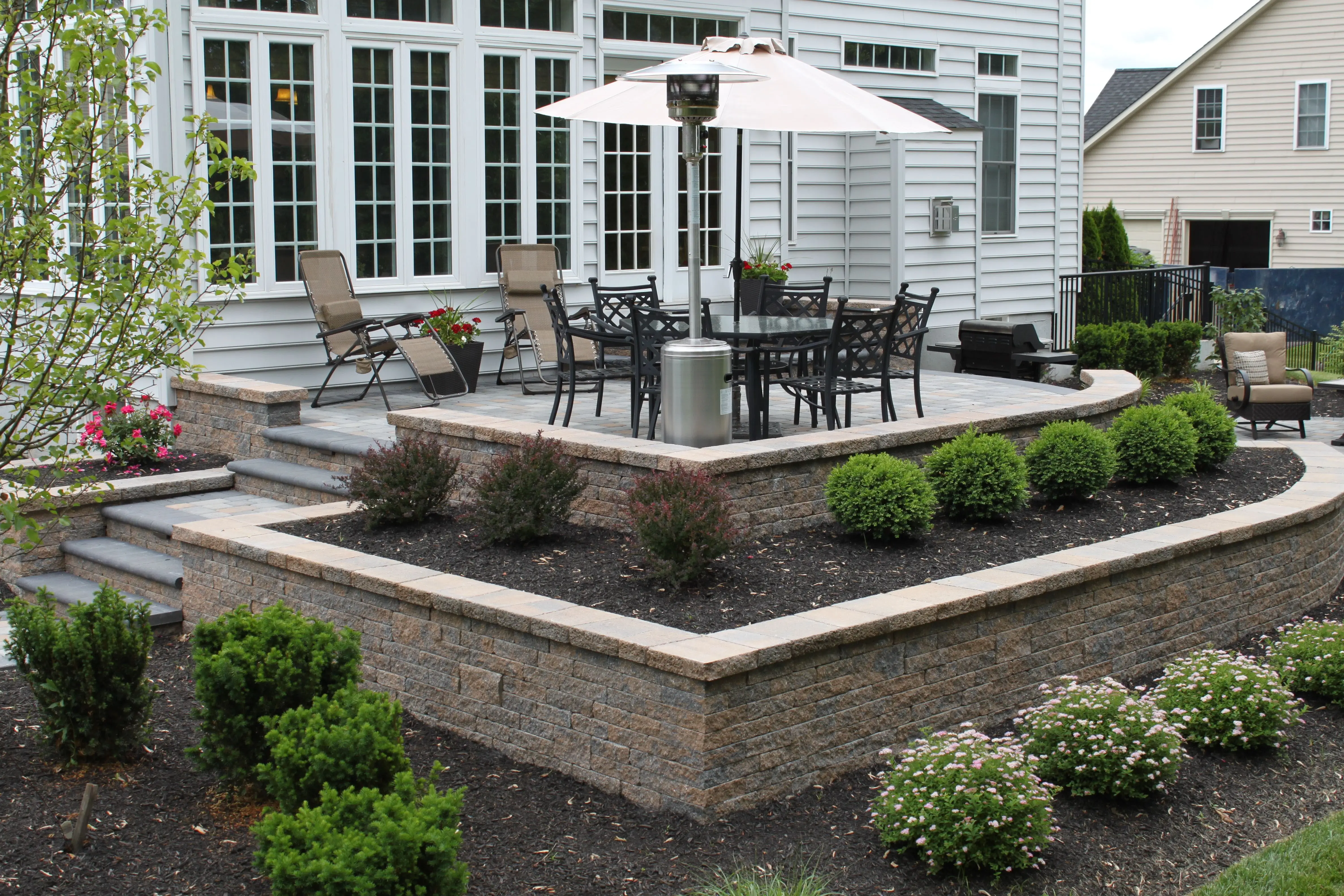
source: pinterest
Eco-friendly paver patios offer numerous benefits that make them an excellent choice for any homeowner. Choosing sustainable options also means investing in the long-term health of your outdoor spaces. Eco-friendly paver patios are designed to last, requiring less maintenance and fewer resources over time. This can lead to cost savings and less hassle, allowing you to enjoy your beautiful patio with peace of mind.
For those considering their next home improvement project, eco-friendly paver patios are a great option. They combine the best of both worlds – beautiful design and environmental responsibility. Whether you’re updating your backyard or planning a new patio, choosing sustainable materials is a step toward a greener future.
To learn more about eco-friendly paver options and how they can enhance your outdoor space, reach out to a professional installer. They offer a wide range of sustainable paver solutions that are perfect for any project. Make your next home improvement project an eco-friendly one with Coastal Patio Pavers.
Frequently Asked Questions
What are the most environmentally friendly pavers?
The most environmentally friendly pavers are permeable pavers and those made from recycled materials. Permeable pavers are made from materials like porous concrete, gravel, or natural stones. Recycled pavers, on the other hand, are made from repurposed materials such as old bricks, concrete, or even rubber, making them an excellent choice for sustainability.
What is the best paver to use for a patio?
The best paver for a patio depends on your priorities, but many people prefer concrete pavers for their durability, affordability, and wide range of colors and styles. For a more sustainable option, permeable concrete pavers or those made from recycled materials are great choices. They offer the same benefits as traditional pavers while being kinder to the environment.
Are concrete pavers sustainable?
Yes, concrete pavers can be sustainable if they are designed to be permeable or are made from recycled materials. Permeable concrete pavers help manage stormwater runoff and reduce erosion, making them environmentally friendly. Additionally, using recycled concrete to produce new pavers reduces waste and conserves natural resources.
Are pavers good for the environment?
Yes, pavers can be very good for the environment, especially when eco-friendly options are chosen. Permeable pavers are a sustainable choice because they allow water to pass through, reducing runoff and helping recharge groundwater. This can prevent erosion and flooding issues. Additionally, pavers made from recycled materials, such as crushed concrete or reclaimed stone, help reduce waste and minimize the environmental impact of new production.


